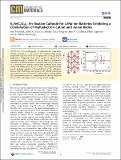K2Fe(C2O4)2 : an oxalate cathode for Li/Na ion batteries exhibiting a combination of multielectron cation and anion redox
Abstract
The development of multielectron redox-active cathode materials is a top priority for achieving high energy density with long cycle life in the next-generation secondary battery applications. Triggering anion redox activity is regarded as a promising strategy to enhance the energy density of polyanionic cathodes for Li/Na-ion batteries. Herein, K2Fe(C2O4)2 is shown to be a promising new cathode material that combines metal redox activity with oxalate anion (C2O42–) redox. This compound reveals specific discharge capacities of 116 and 60 mAh g–1 for sodium-ion batterie (NIB) and lithium-ion batterie (LIB) cathode applications, respectively, at a rate of 10 mA g–1, with excellent cycling stability. The experimental results are complemented by density functional theory (DFT) calculations of the average atomic charges.
Citation
Pramanik , A , Manche , A G , Sougrati , M T , Chadwick , A , Lightfoot , P & Armstrong , R 2023 , ' K 2 Fe(C 2 O 4 ) 2 : an oxalate cathode for Li/Na ion batteries exhibiting a combination of multielectron cation and anion redox ' , Chemistry of Materials , vol. 35 , no. 6 , pp. 2600-2611 . https://doi.org/10.1021/acs.chemmater.3c00063
Publication
Chemistry of Materials
Status
Peer reviewed
ISSN
0897-4756Type
Journal article
Description
Funding: The authors thank the EPSRC for financial support (EP/R030472/1). A.G.M. thanks the Faraday Institution for financial support and training (grant number FITG033). A.R.A. thanks the Faraday Institution for financial support (FIRG018). The authors are grateful for the provision of beam time on B18 at the Diamond Light Source (as part of the Energy Materials Block Allocation Group SP25120). The authors also would like to acknowledge the EPSRC Light Element Analysis Facility Grant EP/T019298/1 and the EPSRC Strategic Equipment Resource Grant EP/R023751/1.Collections
Items in the St Andrews Research Repository are protected by copyright, with all rights reserved, unless otherwise indicated.

